SALVATIONIST
CLIMATE EMERGENCY TIME TO CARE FOR CREATION



MAKING an impact can be a positive or a negative thing. As we consider our environment in this week’s issue, we are each encouraged to think about reducing our negative impact on the planet. The Salvation Army is calling on the government to play its part and, as it declares a climate emergency, is also declaring what it will do to be better stewards of the resources that God has given us. It’s long-term thinking and is therefore not just about us but also about others and those who will hopefully inherit the world we leave behind.

In our Bible study, Territorial Envoy Roger Coates describes the early Church and the way in which they had to respond to the needs of others as they grew and became established as a movement. He asks if our glasses are full to overflowing.

In our abundance as a society, what is overflowing into our world is evidence that we are using more than we need without regard for others. Our challenge, surely, as God’s people is to ensure that our overflowing is instead evidence of the abundance of his love, which is available to all.
May it be so for each of us.
MAJOR JULIAN WATCHORN EDITOR
ARE YOU FULL OF THE HOLY SPIRIT?

Issue No 1912
Helping-Hand Appeal 2023
Read more and donate Bounce

Introducing a new resource
EDITOR Major Julian Watchorn
MANAGING EDITOR Ivan Radford
EDITORIAL ASSISTANTS Simon Hope, George Tanton, Lyn Woods, Major Margaret Bovey
ART DIRECTOR Hannah Holden
GRAPHIC DESIGNERS Mark Knight, Louise Phillips
PROOFREADER Chris Horne
CONTACT US 020 7367 4890 (main) salvationist@salvationarmy.org.uk
ADVERTISING advertising@salvationarmy.org.uk
DISTRIBUTION AND SUBSCRIPTIONS
Salvationist Publishing and Supplies (Periodicals), 66–78 Denington Road, Wellingborough NN8 2QH 01933 445445 / subscriptions@satcol.org
FRONT-PAGE PICTURE
Photo by Sarah Mensah
SCRIPTURE QUOTATIONS
From the New International Version (2011), unless otherwise stated
FOUNDER William Booth
GENERAL Brian Peddle
TERRITORIAL COMMANDER
Commissioner Anthony Cotterill
EDITOR-IN-CHIEF Major Julian Watchorn
TERRITORIAL HEADQUARTERS
101 Newington Causeway, London SE1 6BN 0845 634 0101

© The Salvation Army United Kingdom and Ireland Territory. ISSN 2516-5909.
The Salvation Army is a Christian church and registered charity. The charity number in England, Wales and Northern Ireland is 214779, in Scotland is SC009359 and in the Republic of Ireland is CHY6399.
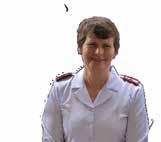
Published weekly by The Salvation Army and printed on paper from sustainable sources by CKN Print, Northampton.
@SalvationistUKI
@SalvationistUKI

THE second season of Our Planet, narrated by Sir David Attenborough, is released on Netflix this month (14 June), with a focus on migration and an invitation to ‘experience life’s extraordinary journeys’. The first season, which aired in 2019, addressed fundamental issues of conservation and humanity’s impact on the environment and climate change, affecting all living creatures.

At 97 years of age, Sir David has been challenging humankind’s selfish and destructive behaviour towards the planet for decades. He warns in the series that ‘the next 10 years are crucial in taking action to aid the recovery of our planet
Do you regularly consider humankind’s impact on our planet as part of your Christian journey?
How can we learn from Scripture about being better custodians of creation?
What can your corps or centre do together for the environment?
for future generations’. We know that those who are suffering the worst effects of climate change – often due to inequalities – are the ones who have caused the least harm to the environment.
Scripture reminds us that, as Christians, we are charged with the responsibility of caring for planet Earth and challenged by our holy Creator on this issue. How effectively are we listening and leading the way in caring for God’s creation?
Psalm 24:1 declares: ‘The Earth is the Lord’s, and everything in it. The world and all its people belong to him’ (New Living Translation). Psalm 8:3–8 recognises that we are called to be good stewards of creation, including care for all living creatures. God placed us in a position of trust; he has given us wisdom and insight, and we have let him down. Humans are polluting the planet, causing climate change, destroying natural habitats, depleting valuable resources and wiping out whole species.
We are all aware of the damage being done and yet so many people choose to live in ignorance, believing that it only affects future generations or people in other countries. We may feel helpless in the enormity of the task, but through faith and in God’s strength we must be compassionate enough to act. If nothing else, we can take it to God in prayer.
Paul writes in Romans 8:22–26: ‘For we know that all creation has been groaning as in the pains of childbirth, right up to the present time... The Holy Spirit helps us in our weakness, the Holy Spirit prays for us with groanings that cannot be expressed in words’ (NLT).
In Colossians 1:15–17, Paul reminds the Church: ‘Christ is the visible image of the invisible God. He existed before anything was created and is supreme over all creation… He holds all creation together’ (NLT). When creation seems far from ‘together’, let us turn to the one who is supreme for wisdom, courage and strength to act.
Each season of Our Planet takes four years to produce. What will you do over the next four years to make a real difference to God’s precious creation? Will you be able to look back confidently and say that you acted with care and compassion, so that future generations around the world have the opportunity to experience life’s extraordinary journeys and have life in all its fullness as Christ intended?
LYN WOODS Editorial Assistant Salvationist
IWAS brought up in a Salvation Army family. My mother had previously been a Salvation Army officer, so our house was a place where people came if they had any problems. Many was the time when my sister and I slept in my parents’ bedroom while someone else, either experiencing homelessness or just out of prison, slept in ours.
myself at the local police station to begin my employment, I was told that they did not take married policewomen – this was 1971. Fortunately, I got a job with community welfare and the then South Australian government paid for me to go to university as a mature student and I studied child development and social work.
What do you love, or not love, about the Army?
How friendly everyone is.
Which book – apart from the Bible – would you want on a desert island?
The World of Birds.
What’s your favourite Bible verse or passage?
Psalm 23.
What do you like to do in your spare time?
Read, do crosswords and grow Bonsai and veg.
If you were president of the world, what’s the first thing you would do?
Seek world peace.
What advice would you give to your younger self?
Stay in the RAF.
Give your testimony or life story using only one word. Hope.
Our family motto was always ‘Jesus first, yourself last and others in between’. My sister and I had a very happy childhood, often spent at The Salvation Army Sunday school. After the evening meeting, people came back to our house for supper, which was usually chips and anything left over from the day’s meals. During the week it was joy hour, choir practice and junior band practice – I played trombone.
As a young woman, I became a police officer. I started on the beat and later transferred to CID as a detective. However, emigrating to Australia was on the cards, so eventually my husband and I left the UK on a £10 ticket. Upon arriving in Australia and presenting
My career blossomed and I worked in various capacities. Eventually I was asked to redevelop a parenting unit for vulnerable women and their babies. During this time I had my son, Stephen, but sadly my marriage did not work out and I got divorced.
I continued with The Salvation Army, singing in the choir and playing trombone in the band. After returning to the UK, I got married to the love of my life, Ray. His two daughters, Victoria and Amanda, came to live with us. Together with Stephen we were blessed with a very happy home life. I worked in education, firstly in Clwyd, and eventually managed the education welfare service in Cheshire as principal education welfare officer.
Ray and I travelled a lot and life could not have been better. Sadly, Ray developed a brain tumour and died in 2004. This was a very bleak time for all of us, but my faith kept me going. I knew that God would take care of me and my family and would prepare a new way ahead.
My faith and The Salvation Army have continued to play a big part in my life. Although I continue to make many mistakes, I try each day to be a better person.
Have you got a testimony to share? We’d love to hear your faith journey! Get in touch at salvationist@ salvationarmy.org.uk


MAY 1940. Hitler’s feared panzer divisions had broken through the Ardennes, trapping the depleted Allied armies at Dunkirk. With the English Channel at their backs, the Allies faced immeasurable odds, as the evacuation – known as Operation Dynamo – commenced. From 26 May to 4 June 1940, 338,000 Allied servicemen were evacuated, along with 123,000 beleaguered French and Belgian troops. Amid the chaos and trauma was The Salvation Army.
In September 1939, Salvationist field ambulances had accompanied the British Expeditionary Force across the Channel. In a report by The West Middlesex Gazette, published 17 days after the evacuation, Colonel Booth Davey praised the aid-workers of The Salvation Army in France, particularly the women, who ‘had not flinched even when confronted with the horrors of war’.
During the retreat to Dunkirk, The Salvation Army lost £65,000 worth of medical supplies, many of which had to be abandoned or was destroyed. On the beaches, Salvationists prayed with the men as the Luftwaffe rained down bombs and bullets. The Evening Telegraph reported that, during the evacuation: ‘Salvation Army workers stood at their posts until the last possible moment. Never once did they leave the troops until they were ordered to do so by the military authorities.’
One Salvationist serviceman who survived Dunkirk was 19-year-old
Private Harold Banks of the Royal Berkshire Regiment. He sustained a leg wound, caused by shrapnel from an exploding shell. He also witnessed two of his comrades die in an aerial attack.

His son, Commissioner Keith Banks, recalls that Dunkirk was ‘so brutal for him that he wouldn’t talk about it’.
During the evacuation, Harold accidentally dropped his Bible over the side of the boat, but thankfully retrieved it. That Bible is now treasured by Keith as a reminder of his father’s wartime experience.


A member of Wokingham Corps in his civilian life, Harold’s Christian faith sustained him during the war.




‘His trust in the Lord was beyond any doubt and any question,’ testifies Keith.



Back in England, The Salvation Army was ready to meet the spiritual and physical needs of the evacuated Allied troops. The 1941 year book reports: ‘Our mobile canteens supplied tens of thousands of the British and French troops evacuated from Dunkirk with tea and refreshments as they landed at south coast ports. The canteen staffs toiled day and night, spurred on by the men’s gratitude.’
In the aftermath of the evacuation, Salvationists were also heavily involved in assisting refugees. A French army officer had urgently enquired to Major Florence Langford about the fate and welfare of his family. This story was reported in a Lincolnshire paper: ‘[He] was full of anxiety about his wife and child, caught in the refugee sweep from northern France. Called back to his regiment, he told his story to the major, who arranged for enquiries to be made, and two days later wired him that all was well, and the missing ones had been sent to relations in Yorkshire, after an adventurous escape from Dunkirk.’
Reminiscing at a lecture in Belfast in 1954, Commissioner Joshua
James championed the work of Salvationists during the Second World War: ‘[They] followed the example of Christ who washed the feet of his disciples. When the men came back from Dunkirk, members of The Salvation Army washed and bandaged 6,500 feet.’
ARE you a glass half-full or glass half-empty person? Or perhaps I should ask: are you like a glass full to overflowing?
In Acts, Luke outlines the success of the early Church, starting with the 12 apostles and then joined by women and Jesus’ mother and brothers. Before Pentecost, the group numbers about 120 (see Acts 1:14 and 15). At Pentecost, 3,000 believers are added and then ‘the Lord added to their number daily those who were being saved’ (Acts 2:47). What a great start! The disciples had clearly taken on board Jesus’ commission to ‘go and make disciples of all nations’ (Matthew 28:19). However, there were challenges with this rapid growth. It meant some choices needed to be made in order that the number of followers of Jesus continued to grow.
Consider the choices you have made to connect with God’s mission.
How are you growing the Kingdom of God?
I wonder how you make decisions. If you’re making a significant purchase, are you someone who spends considerable time researching everything, looking at reviews, comparing similar products before coming to a conclusion and, only then, making an informed decision? Or are you an impulsive person who goes with the first thing they see?
The early Church needed to not only remember Jesus’ teaching but also organise if it was to grow outside
Jerusalem as the Great Commission commanded.
Luke gives us insight into a specific challenge. The widows of Hellenistic Jews who had become disciples were being overlooked in the daily distribution of food, so they complained against the Hebraic Jews. With the Church just getting off the ground, the focus was still in Jerusalem with Jews. If the early Church couldn’t include different kinds of Jews, namely Greek-speaking, how was it ever going to live out the Great Commission?
If the Church was not together while still in Jerusalem, how was it ever going to cross over ethnic and cultural borders and reach entirely different people groups?
The apostles looked for an internal solution to their problem. They seemed very clear on their role, and it wasn’t to be dealing with the distribution of the daily requirements. They were called to focus on preaching and prayer. However, they needed godly people to look after and care for the Church as it grew.
Take a moment to think about a successful team in the world of sport, business or the Church.
Who would you choose to join it?
What is it that makes that team successful?
Jesus started with a team of 12 disciples. In Acts 6, we read that it became clear that they needed more people to help them, particularly with the immediate problem of daily
distribution to those in need.
They resolved to select seven men. It wasn’t enough to choose any seven men; they needed to have captured the vision and mission of the Church and be filled with the Spirit. This was about teamwork, about sharing the load and maintaining the momentum of the growing Church.
The seven men chosen were identified as ‘full of the Spirit and wisdom’ (v3). These should be men who demonstrate servant leadership among other gifts. What a responsibility to choose the right people and a responsibility for those chosen – the future of the Church was at stake!
We sometimes sing: ‘Spirit of the living God,/ Fall afresh on me./ Break me, melt me, mould me, fill me’ (SASB 312). What does it mean to be filled with the Spirit?
What did it mean for these men of the early Church?
What does ‘being filled with Spirit and wisdom’ mean for us?
How might the Holy Spirit’s infilling impact our daily lives?

For the chosen seven men, being filled with the Spirit involved practically caring for members of the Church, using their gifts and passions and, in doing so, bringing glory to God in the Church and in the world. This happens because they first give themselves totally to God for him to use.
The same can be said for us today: on our own we can achieve little, yet, with
Coates reminds us to live out our discipleship in the best possible way
God, our willingness to be useful can achieve much in building his Kingdom.
The solution to the problem allowed the apostles to concentrate on prayer and preaching. The appointed seven embraced their role – ‘to wait on tables’ (v2) – and ensured fair treatment for all those needing food. The outcome? ‘The word of God spread. The number of disciples in Jerusalem increased rapidly, and a large number of priests became obedient to the faith’ (v7).
Love God, Love Others is our Salvation Army strapline. It comes straight from the teaching we find here in Luke. It can be a big ask! We need to be in step with God – not wanting things for ourselves but wanting God’s heart for the world in which we live today. How does being empty of self and full of the Holy Spirit impact how we live?
So, back to the question we started with. Is your glass half-full or half-empty? Or, is your glass full to overflowing, so much so that it spills out the love of God and the power of his transforming grace, splashing over the lives of those you meet?


What is God calling us to be in the Church today?
How can we live out our discipleship full of the Holy Spirit?
Prayer Matters contains daily devotions covering specific areas in the territory, current worldwide situations and personal reflection and relationship with God. A PDF of the unedited booklet is available to download from salvationist.org.uk/resources

SATURDAY 3 JUNE – ISAIAH 58:6
Father, I pray for courage to raise my voice in the courts of political, economic and social powers which are bringing about climate change and keeping people in poverty. Amen.

SUNDAY 4 JUNE – 1 TIMOTHY 6:6–8
Lord, this Environment Sunday, give ‘rest for the ravaged Earth, oceans and streams/ Plundered and poisoned – our future, our dreams./ Lord, end our madness, carelessness, greed;/ Make us content with the things that we need’ (SASB 998).
MONDAY 5 JUNE
Think about the women whom you influence and those who influence you, women you have a relationship with, women you are related to, women you serve, women who serve you, women you look up to and women you might feel threatened by. If you identify as a woman, think about yourself. Ask God to direct your thoughts and pray in response to his direction.
TUESDAY 6 JUNE

In your prayers today, ask God to expand your understanding of what women bring to leadership roles. Thank him for good female role models in your life and ask him to keep guiding and protecting them.
WEDNESDAY 7 JUNE
What is your attitude towards gender justice? Do you diminish your own feelings of disempowerment or fear because ‘others’ are worse off? Are you aware of women who are not being treated fairly or kindly? Pray for courage to ask for help, or strength to stand up for a woman who is struggling just now.
THURSDAY 8 JUNE
Every three days a woman in the UK is killed by a man, who in most cases is a current or ex-partner. At least one in four women will experience domestic abuse. Jesus came to our world to bring hope, commanding us to love one another in the way he loves us. Pray that God will use us to show his love to victims and survivors of domestic abuse.
FRIDAY 9 JUNE
‘My grace is enough; it’s all you need’ (2 Corinthians 12:9 The Message). Today marks the start of this year’s Riverbank Conference, with the theme Enough is Enough. How does that phrase resonate with you? Are you responding with a feeling of gratitude? A sense of injustice? Pray that God’s grace will be all that we need as we focus on his provision and our response.
PRAYER REQUESTS
Do you have something or someone you’d like us to pray for? Email salvationist@salvationarmy.org.uk with ‘prayer request’ in the subject line and the Territorial Prayer Network will uphold them in prayer.

As part of our territorial mission priority of caring for creation, what can people expect to see at Together 2023 that will make it a sustainable event?
As territorial environmental officer, my strapline for everything the Army does in this territory is ‘tread softly’ – in all we do, let’s think about this world and how we can ensure we are tenderly protecting this beautiful planet God has gifted to us.
Everything we’ve been planning for Together 2023 has been through the lens of caring for creation. We’ve been thinking about waste, how people will get to Fairfield Halls in Croydon and the resources we will use over the weekend. We are being as waste-free and carbon-light as possible.
What other environmental initiatives or activities will there be?
There will be a care for creation walk in the nearby Queen’s Gardens, and resources aimed at helping people understand the spiritual motivation behind this missional agenda. The brilliant team at SP&S are also thinking about the environment and will be providing a drop-off space for those attending the event to donate pre-loved formal uniform items for re-use and recycling as part of their Uniform Take Back Scheme. You can also arrange a donation online – for more information, visit salvationist.org.uk/uniformtakeback
What can people travelling to Together 2023 do to offset their carbon emissions?
Two things. First, consider how you get there. If you’re close enough and you can walk or cycle, that would be amazing. That would be, by far, the best option. If you can travel by public transport, that would be fantastic. If you can’t do that and have to use a car, then try to find out if there are others with whom you can car-share.
Second, think about how you can offset the fossil fuels you have used to get there. Why not donate to the Woodland Trust to help plant a tree, for example? Wouldn’t it be great if everyone travelling to Croydon planted at least one tree? That would make a Together 2023 forest!

WHAT: Together 2023
WHERE: Fairfield Halls, Croydon

WHEN: 14–16 July
BOOK YOUR TICKET: salvationist.org.uk/together
What’s the theological rationale behind caring for creation?
God loved the world, so should we. It’s that simple. When we think about John 3:16 – ‘God loved the world so much that he gave his only Son’ (Good News Bible) – the word ‘world’ is translated from kosmos. We often think of that verse as meaning just people, but God loved the created order so much that he gave his Son. And we know that creation is groaning and waiting for its redemption (see Romans 8:22), just as we are. We have a responsibility and a mandate to work together with God to bring about that freedom, that redemption.
How can people from around the territory get involved in the care for creation conversation where they are that weekend?
There are four C’s that help me remember what we can do, wherever we are.
First, church: sign up to an eco church scheme and find ways to tread carefully. See ecochurch.arocha.org.uk or ecocongregation.org
Second, community: find out about what’s happening in your area already, from vegetable gardens to repair workshops, and get involved.
Third, conduct: think about cutting down your impact on the environment in terms of travel, energy usage – domestic and commercial – and diet. How about having a meat-and-dairy free Sunday, for example?
Fourth, campaign: talk to your local MP, raise your voice and sign petitions. The government has made promises to reduce our reliance on fossil fuels and we need to hold them to account.
Where can people go to find out more about caring for creation?
Visit salvationist.org.uk/environment
FOR people all over the world, getting clean water is a daily struggle. Nearly one fifth of the world’s population lives in areas of high or extremely high water vulnerability and the climate crisis is making things worse. Climate change and water scarcity are inextricably linked.
The United Nations states: ‘Extreme weather events are making water more scarce, more unpredictable, more polluted or all three. These impacts throughout the water cycle threaten sustainable development, biodiversity, and people’s access to water and sanitation.’
The impacts of the climate crisis are being felt by communities around the world today. This is not a distant issue, but a devastating reality for millions. The Salvation Army is working alongside communities to find solutions to the challenges of water scarcity, food insecurity and more. Projects that seek to address these issues are taking place all over the globe.
In the Karonga district of northern
During 2023, Salvation Army corps and groups across the UK and Ireland will raise money for international clean water projects through the Helping-Hand Appeal. Order a free fundraising pack by calling 020 7367 4777 or download all the resources from salvationist. org.uk/helpinghand
£15 could give a person clean water for life through access to a sand dam
£45 could provide training in the maintenance of boreholes
£470 could construct a toilet in a school
£1,450 could install a shallow well alongside a sand dam
Over the course of one day – or longer, if you choose – donate £1 for each time you use the loo!
Malawi, The Salvation Army is partnering communities through an integrated water, sanitation and hygiene project. It includes, among other elements, the installation of boreholes for improved access to safe water, the construction of toilet blocks and handwashing facilities in schools, and training in water-smart agricultural practices.
Esther Kaonga is chairperson of the village development committee in Lameck Kambombo, Karonga, where she lives with her husband and four children. She shares the impact that the new borehole has had for her family and others living in the area:

‘We reached out to The Salvation Army because we were having problems with diseases. The water we were using was contaminated and we suffered from diseases like cholera and malaria. We drew water from the rivers and had no way to treat the water so we fell sick again and again.
‘My children are clever, but because I needed their help collecting water, they would miss classes. It was hard for them.
Now, we are flexible, we are happy and we are hygienic. Now, we drink safe water. There is no more malaria in the community.
‘The project has also included training community members on construction and usage of pit latrines, and how to install tippy taps for handwashing. We are thankful for this borehole – it has given us new life!
‘Using water from this borehole means our villages have improved greatly. Many people in the area draw water at this borehole, so another borehole is needed.’
Indeed, people are still required to travel long distances to reach this borehole. It is much better than travelling to collect unsafe water, of course, but the fact remains: more boreholes are needed.
HAYLEY STILL UK Engagement Co-ordinator International Development
Hayley Still shines a spotlight on the difference safe and clean water makes
‘It has given us new life’
ON World Environment Day (5 June), The Salvation Army in the UK and Republic of Ireland is declaring a climate emergency (see p13).
The declaration is an extension of the territory’s care for creation mission priority and recognises solidarity with people and organisations the world over who are taking a serious stance on fighting climate change – for a detailed breakdown of the Army’s understanding of environmentalism visit salvationist.org.uk/caring-environment
As the territorial environmental officer, Heather had a key role in drafting and developing the declaration. The Army’s sciencebased target is to reduce its carbon footprint by at least 50 per cent by 2030. Heather assuages any concern that this goal is empty words by outlining the organisation’s ‘willingness at every level’ and ‘priority to invest’, adding: ‘The Army has already invested in sustainability expertise across the territory!’
18 corps now have solar panels
So what does this look like practically? Alongside creating Heather’s position – a new role – the organisation has renewed its ISO 14001 environmental standard certificate. An environmental committee comprising members from a range of departments –including Research and Development, Finance and Resources – is now monitoring the Army’s environmental impact. A smaller sustainability group meets every month to address the practicalities of proposals, such as tracking a path to net zero carbon emissions. For example, a baseline survey of the territory’s property portfolio has found where emissions are worst, highlighting areas that need more attention.
Some groups, however, have already taken the initiative. Way back in 2009, Woking Corps was the first UKI Army property to install solar panels on its hall. So far, 18 corps have installed solar panels with the help of legacies and fundraising efforts, and at least 10 other installations are in development. Solar panels cost about £1,300 per kilowatt peak (kWp).
Twenty panels, for example, would cost in the region of £10,530 to install.
Hadleigh Farm has also taken creative approaches to improve its sustainability, along with Strawberry Field, which has rooftop solar panels and makes every effort to be wasteconscious, recycle and reduce single-use plastic.
The new THQ building, which opens later this year, is aiming for a rating of ‘Excellent’ with BREEAM – the world’s leading measure of building sustainability – ensuring it is in the top 10 per cent non-domestic sustainable buildings in the UK. Its design includes solar panels, energy-saving measures and bicycle facilities for staff members, as well as bat-boxes in the surrounding wooded areas of the plot.
On a local level, one easy way that corps are approaching sustainability is by switching to eco church models. Heather hopes that 30 per cent of the territory will be registered as ‘eco corps’ by the end of the year – at present,

5 per cent are registered. Nevertheless, with the Army’s first silver Eco Church award at Watford Corps joining 11 more bronze awards, momentum is building.

At the core of the eco corps push is the environmental champions network, which is growing by the week. This community of hope and enthusiasm is uniting and empowering people to spearhead local eco projects, which are blossoming wider than Heather ever imagined. And this unity is an important component in pursuing lasting change.
Heather highlights the importance of the No Faith in Fossil Fuels pilgrimage to parliament, which took place in London last month: ‘We can recycle all our paper, but the government needs to bring in policy that drives deep significant change. A government is about listening to its people and responding to their needs, so we must raise our voices. We need to write to our MPs and get involved in local councils to make this matter.’
She describes donning her uniform that morning as ‘putting my battle dress on’, affirming that this ‘won’t be the last time we’re out’.
But denouncing fossil fuels raises an important question: what about the Army’s fleet? While many of the territory’s vehicles are now hybrids, conversations are ongoing about making the switch to electric. In fact, 70 per cent of the Salvation Army Trading Company Ltd’s (SATCoL) company cars are already electric.
SATCoL has long made a positive environmental impact by giving new life to unwanted items through its charity shops and, more recently, its new Uniform Takeback Scheme, but projects also include turning waste into usable blankets and worn-out jeans into bags.
While progress has been made on many levels, significant investment of time, money and expertise is needed to meet the Army’s targets. With talks on the table of aiming to be net zero by 2040, there’s still a lot to be done.
‘Our incentive is missional,’ Heather reminds

me. ‘This is about God’s creation! We’re starting to feel the impact, whereas before it’s always been a problem for somewhere else or future generations. But we’re a justice movement, and we cannot be responsible for this injustice anymore.’
l For information on becoming an environmental champion or starting your eco corps journey visit salvationist.org.uk/ environment or email environment@ salvationarmy.org.uk
The Salvation Army is encouraging corps, centres and individuals to give a third of their gardens and natural spaces to biodiversity. Pick up a free pack of bee-friendly wildflower seeds before 5 June by emailing resources@ salvationarmy.org.uk

“ The new THQ building, which opens later this year, is aiming for a BREEAM rating of ‘Excellent’.”
70% of SATCoL’s company cars are electric
DIVISION:
We are so blessed to have Major Heather Poxon, the territorial environmental officer, as a member of our congregation. She’s taken the lead in teaching and co-ordinating action on eco matters for our corps. We are in the process of submitting the forms to become a bronze award Eco Church.
We are starting an allotment ministry to encourage all members to join in helping our Eco Church programme, giving children the opportunity to appreciate God’s creation and nature, as well as providing outdoor space for our fellowship and others in the community.
It’s about environmental initiative, but I believe Eco Church is beyond the literal meaning of the environment itself. In Greek the word eco is oikos, meaning household. In this sense, creation itself is understood as a holistic household of God. The word also means logos, which is linked to the Word of God. It is important to share the message and meaning in biblical preaching and in Bible study and in all things. It’s about interconnectedness, not merely recycling or using Fairtrade goods.
We waste so much, so it’s about caring and connecting to our eco system by living simply, spending less and sharing more. In sharing these principles of generosity and simplicity, through biblical teaching and prayer, we become a holistic Eco Church and we can reach out to more people. For example, our corps holds community evening meals five days a week, which is a huge project in partnership with a
local group. We also run a weekly food bank, addiction support classes and employment sessions, and we help to provide carpets and furniture for families in need.
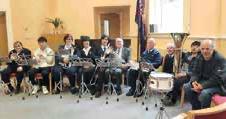
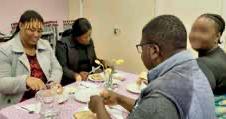
St Albans Cathedral has recently joined with us in environmental matters. A canon in charge of their Eco Church programme is engaging with Churches Together in our community. It is about networking and getting to know more about groups and ways of being and doing and the relational aspects. We are hopeful to expand this valuable community network where we share ideas and discuss how we can do better because we live in the same community, in the same creation.
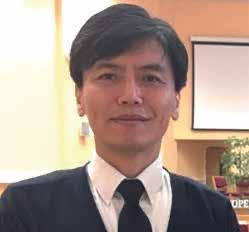
We still need extra support from local authorities. Out of the cost of living crisis a two-tiered consequence has emerged – we are receiving fewer donations from the public compared to previous years and yet we have more folk seeking our help. Our church is struggling to meet public needs. Eco Church requires extra investment, and we must carefully navigate how we achieve this.
Eco Church goes beyond our oftennarrow outlook of recycling things or wasting less. It’s central to biblical teaching to live and worship as a holistic household in the Spirit of God. I encourage people to share this connection as a principle and practice of Eco Church and to widen our perspective.
Our congregation has more than doubled in size in recent years, including new members from Namibia, Zimbabwe, Nigeria and Hong Kong. After many years, the band has re-formed thanks to a whole variety of new band members. We are finding that the simplest acts of kindness can bring positive rewards. As Christians we are not called to compassionate detachment – empathy is required. When we see other people as we see ourselves, with hopes, dreams and fears, that connection can be the foundation for relationships built on trust and understanding. That’s what our mission is all about.
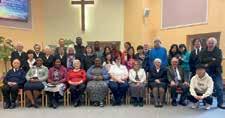
Caring for creation is one of the territory’s five mission priorities. Find out more by emailing environment@salvationarmy.org. uk or visiting salvationist. org.uk/environment
AS members of the High Council gathered to elect the 22nd General of The Salvation Army, there was an air of solemn contemplation and sacred surrender to the Holy Spirit’s leading.
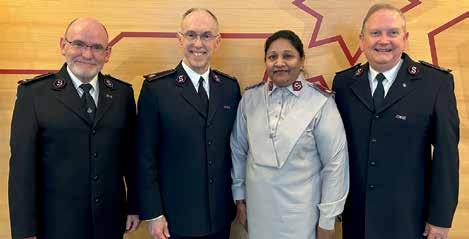
The High Council formally commenced on 22 May and, after the required legal preliminaries, elected Commissioner Kenneth Hodder (National Commander, United States of America) as its president and Commissioner Eva Kleman (Zonal Leader/Zonal Secretary for Women’s Ministries, Europe) as its vice-president. Commissioner Yusak Tampai (Territorial Commander, Indonesia Territory) was elected as chaplain.
Prayers from those who attended the Welcome to the High Council and Farewell to the General and Commissioner Rosalie Peddle, or from those who submitted online, were a source of encouragement and enrichment to the council’s members.
On the second day, the members of the Questions Committee were elected to formulate the questionnaire answered by each candidate and their spouse, if married. The council’s members were invited to submit possible questions.
The committee members were Commissioner Merle Heatwole (Latin America North Territory), Commissioner Devon Haughton (Caribbean Territory), Commissioner John Kumar Dasari (India South Eastern Territory), Commissioner Bente Gundersen (The Netherlands, Czech Republic and Slovakia Territory), Commissioner Miriam Gluyas (Australia Territory), Colonel Alfred Banda (Zambia Territory) and Colonel Diana MacDonald
(Pakistan Territory).
Each day included time for prayer and worship and Commissioner Yusak encouraged members to be in harmony with the Lord as they sought to find the one God had already chosen to serve as General.
On the third day, after the questions were finalised, the council’s members prayerfully made their nominations for candidates to accept the office of General.
Four candidates accepted the nomination: Commissioner Lyndon Buckingham (Chief of the Staff), Commissioner Merle Heatwole (Territorial Commander, Latin America North), Commissioner Kenneth Hodder (National Commander, United States of America) and Colonel Diana MacDonald (Territorial Commander, Pakistan Territory).
Commissioner Keith Conrad (Zonal Leader and International Secretary, Africa Zone, IHQ) was nominated but –although humbled and appreciative of the nomination by his fellow High Council members – for varying reasons declined.
Commissioner Kenneth stepped down as president to the High Council, and Commissioner Brad Bailey (Territorial Commander, USA Central Territory) was appointed as the council’s replacement president. Commissioner Merle stepped down as chair of the Questions Committee and Commissioner Miriam was appointed as the committee’s replacement chair.
The council met briefly on the fourth day before proceedings paused while the candidates and spouses prepared their speeches and answers to the questions.
At the time of going to press, the 22nd General had not yet been elected. To keep up to date with the latest news and announcements, visit sar.my/ highcouncil. – JG
THE Salvation Army in the UKI Territory will formally declare a climate emergency on World Environment Day (5 June).
The announcement sees the Army in this territory align itself with a growing number of citizens, churches, councils, businesses and organisations in encouraging a co-ordinated effort to respond to the climate emergency. Populations covered by jurisdictions that have declared a climate emergency amount to more than 1 billion citizens.
The declaration publicly states the UKI Army’s commitment to pursuing justice and loving its global neighbours, who are already facing the worst of the environmental crisis. It reinforces how urgent this is, inspiring people to play their part and encouraging others to respond to the climate emergency with the necessary ambition.
It recognises that urgent action is required to reduce carbon emissions and to address the impact of climate change. It acknowledges that people in all parts of the world, including the UK and the Republic of Ireland, the Channel Islands and the Isle of Man, have a fundamental human right to clean, healthy and adequate air, water, land, food, education, healthcare and shelter.
As a church, the UKI Army has already made caring for creation one of its mission priorities, based on its calling to love God and love others.
It is committed to: raising awareness of the issues across its communities; agreeing to a zero carbon emissions target across all its direct and indirect emissions and being transparent about progress; supporting all Salvation Army expressions to engage in programmes that will reduce emissions; and enabling communities to reuse clothing and other products through charity shops and clothing collection banks, thereby avoiding carbon emissions from the manufacture of new goods. – AR
DUNSTABLE The band and songsters joined members of a neighbouring church, My Father’s House, for A Night of Hymns in Worship. The mainly traditional music reminded the congregation of the legacy of truths left by the songwriters. Each hymn was introduced by one of the My Father’s House congregation telling how it came to be written and including a Bible text. A joyful evening was shared by two churches praising God. – SB
CIRENCESTER The Gap Sunday Club invited parents and corps members for a ‘nature walk with a difference’. The group looked for things relating to each letter in the word ‘creation’, so that they could thank God for them. These were displayed at the hall along with refreshments. – MG
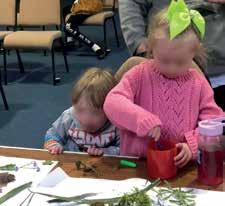
the leadership of Principal Colonel Kenneth Maynor and Assistant Principal Colonel Cheryl Maynor, the session shared in testimony, song, Scripture and prayer. Major Demetrius Stanford (USA Eastern Territory) led the celebration, and other visiting delegates contributed. Captain Ashley Barkmeyer (Australia) delivered God’s word based on Revelation 7:9. All present were encouraged and blessed. – SW

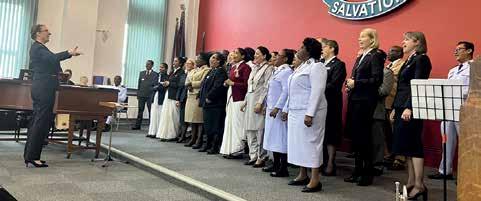
STOTFOLD After a three-year break, the Little Stars baby and toddler group restarted with new volunteers, new children and a new name. Thanks were given to God for the volunteers who have given their time and energy and for the families who attended, most of whom stepped into the hall for the first time. The corps prays that relationships develop and provide opportunities to shine God’s light and love. – HT
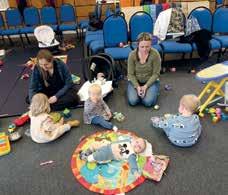
COLCHESTER CITADEL A Saturday evening visit from Chelmsford Band began with music in the city centre and giving out 186 leaflets, which resulted in people attending the Army for the first time. At the concert, the congregation enjoyed singing ‘Soldiers of Our God, Arise’. Music ranged in age and style and the evening culminated in the late Brian Bowen’s grand statement of faith, ‘My Comfort and Strength’. – AL
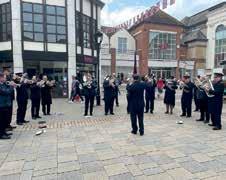
LONDON As the number of rough sleepers in London jumped 14 per cent in the past year, The Salvation Army has called on the government to tackle the underlying reasons. The Combined Homelessness and Information Network found that, of the 3,107 people recorded as sleeping rough between January and March 2023, 67 per cent reported problems with mental health, drugs or alcohol. – AR
ILFORD Shadow Minister for Homelessness and Rough Sleeping
Paula Barker MP and Ilford South MP Sam Tarry visited Malachi Place, the £5 million joint venture funded by the Army and Redbridge Council. The building, made up of 42 self-contained flats, provides year-round accommodation and support for people who have been sleeping rough. Paula said: ‘If we are to tackle the homelessness crisis, we will need to see this type of project replicated in other areas.’ – AR
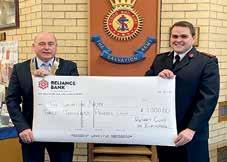
NORTH WALSHAM Coronation weekend began with a screening of the coronation and party at the Resource Centre. On the Sunday afternoon, the band participated in a civic service in the nearby Anglican church and corps leader Territorial Envoy Ruth Morey led the congregation in prayers for King Charles. On the Monday, a charities street fair provided the opportunity to connect with the community by providing activities for children and refreshments, as well as exhibiting Second World War memorabilia. Information was also given to passers-by about corps activities and a kids’ club planned for the summer. – RM
FURZE HILL HOUSE On the Sunday of the coronation weekend, a joint lunch and party took place between Furze Hill House and members of North Walsham Corps. More than 100 people gathered to share in a banquet fit for a king, prepared by Home Manager Jodie Hemmings and the team, and much singing and dancing took place. Trixie, the oldest resident at 103, danced the afternoon away and put some of the youngsters to shame with her enthusiasm. Trixie is pictured with Territorial Envoy Ruth Morey and resident Josephine. – RM
PAIGNTON As part of its mission, the corps is taking every opportunity to connect and build relationships with the community. The fellowship welcomed 61 people to an event celebrating the coronation. The hall was decked with Union Jack bunting and guests were treated to sausage and bacon baps. Children enjoyed coronation-themed craft activities and received a Union Jack and activity book. Adults received a commemorative leather bookmark. – AI
HAMILTON A lunch celebrating the coronation included a quiz about the royal family, with medals given to the winning team. All who attended received homemade knitted and crocheted crowns and had a great time. – WL
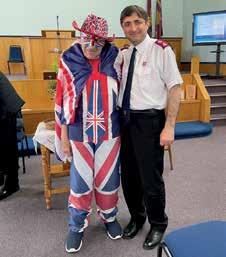
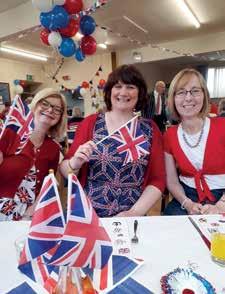
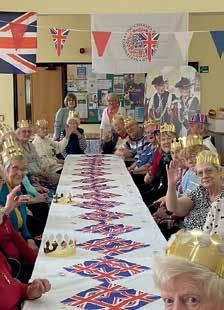
TEDDINGTON On the coronation weekend, corps folk enjoyed a lunch to celebrate together. – EW
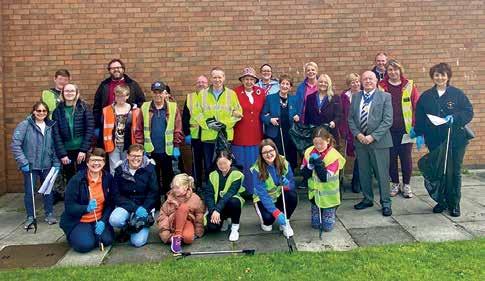
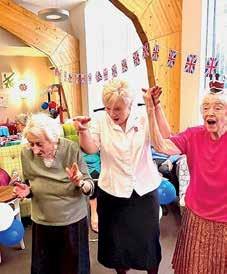
PAULINE Hunter was enrolled as a soldier during a meeting conducted by divisional leaders Majors Pat and Ray Brown. Also pictured are corps officer Major Amanda Banner and Colour Sergeant David Robertson. – AB
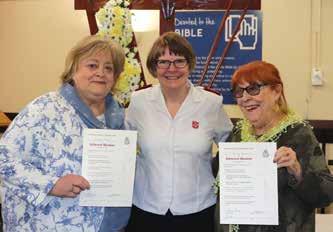
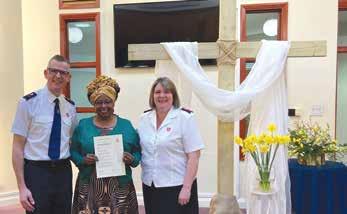
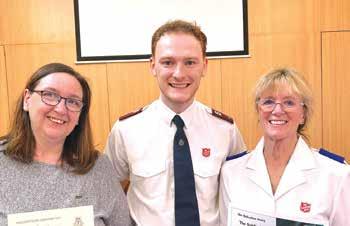
LIZ Russell was welcomed as an adherent by corps leaders Lieutenant Jacqueline Coates and Territorial Envoy Roger Coates. Liz started attending Jumping Jacks toddler church with her granddaughter. An invitation to Sunday worship and Bible study led to Liz joining soldiership studies. Liz feels she is where God wants her and is willing to give more as her relationship with God grows deeper. Liz was supported by her daughter, Laura. God is good! – RC
AS part of the Easter Day celebrations, Rachel Ingram was welcomed as an adherent and Joan Smith was enrolled as a soldier by corps officer Lieutenant Joel Watson. The corps rejoices that people are still responding to the historydefining truth of that first Easter message: ‘I have seen the Lord!’ (John 20:18). – EW
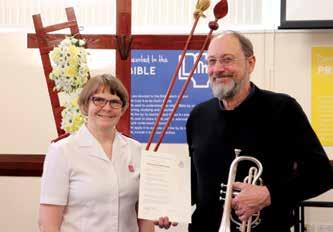
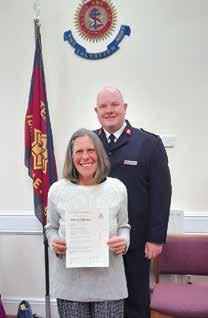
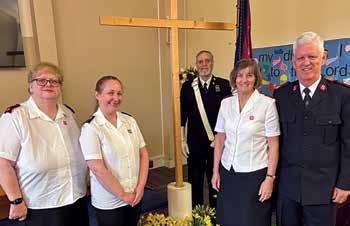
ALISON Mayoss was welcomed as an adherent by corps officer Major Nigel Byrne on Easter Day. Alison started attending meetings 18 months ago and quickly found what she was looking for: a place of worship where she felt loved and valued. Alison takes part in corps activities and worship and recently felt she wanted to make a commitment to the Army and God. – MG
KENNETH Sidney Cox was the youngest child of George and May Cox. He grew up surrounded by Salvationist music and learnt the trumpet in the boys’ band. Among fond boyhood memories, he recounted cycling out on Christmas Day to play carols in surrounding villages. Uncle Fred was bandmaster for many years.
Married to Joan, he brought three daughters up in a loving Christian environment. He loved music and sang in choirs improvising and enhancing with a rich bass voice. He served in the Royal Signals. His brother, Ernie, was a pilot who was shot down and lost over Germany – a great sadness faithfully remembered every November.
Ken worked as an accountant for Robert Brett and Sons in Canterbury. On retiring he followed the ISS to events in Europe and UK venues.

Ken died at the age of 98 peacefully in his own home. – SS
KEITH was born in 1934, the only son of officer parents. His early years were spent in the northwest of England and Scotland, moving to London aged seven.
At age 11, he had one of his most significant and formative seasons thanks to Salvation Army leaders who chose to encourage this young boy. At the age of 17 he moved to Plymouth where he met his wife, Vi. They married in 1956 and had their only child, Graham, in 1960. Keith spent his whole career working for WHSmith, including 27 years at the headquarters in Swindon.
Keith loved cricket, trains – especially steam engines – and Salvation Army bands. For many years he played the flugelhorn. Keith was the corps press officer and kept the corps history books up to date for many years.
Right throughout Keith’s illness, he remained strong in his faith. His quiet, gentle and gracious presence is missed by all. – SR
DOUG was born in Portland in 1926 and soon became involved in corps life along with his family.
He trained to become a stonemason, a career he pursued before and after the war years, when he served in India and Burma. In the 1960s, Doug became general manager of the Cathedral Works Organisation, Chichester, which also restored numerous significant historical buildings, for which Doug received an MBE.

Doug and his family worshipped at Portsmouth North and then Southsea, participating in the music sections. He was appointed songster leader at both corps. He was a fine tenor soloist and a member of Solent Fellowship Band.

Doug was a man of great faith and, while his sight was failing, he would in conversation readily recite verses of songs and Scripture on which he based his life. Doug is now free from pain and at peace with his precious Saviour. – JD/JB
BORN in 1924 and taken to The Salvation Army by his parents, Derek was a lifelong, third-generation Salvationist who eventually became number one on the roll.
In 1942 he enlisted and served in the Royal Artillery as a searchlight operator. Last November he appeared on BBC Look East sharing his experiences of serving on the searchlights. He ended the interview proclaiming that ‘we need to do all we can to bring peace’.
Derek experienced tragedy, losing his first wife, Pat, in 1959 and his second wife, Julia, in 1998. In 2007 his son, Brian, died suddenly. But through all this he adhered to the Scripture given to him when he joined HM armed forces: Proverbs 3:6.
A bandsman for 75 years – serving in the corps, Golden Oldies and the Anglia Fellowship Band – Derek leaves a daughter, four grandchildren and six greatgrandchildren. He will be missed but remembered by family and friends. – MB


AUDREY was a lifelong Salvationist, attending West Stanley from birth until its closure, whereupon she transferred to Consett. She was a faithful, regular attender until the beginning of this year.
Audrey was a dedicated local officer, serving for more than 40 years as home league treasurer, primary sergeant, sunbeams leader, songster and bandswoman at different times.

Noted for her kindness and genuine interest in others, many have paid tribute to Audrey’s strong Christian faith and values, which motivated her careful consideration of others. A truly devoted wife, mother, grandmother, greatgrandmother and sister, she delighted in her family and also valued her many friends. During her final three months, when coping valiantly with a difficult illness, her faith shone strongly. She regularly reminded her family and medical team she was ‘in his hands’.
Our Mam, will be deeply missed. We will hold her in our hearts for ever. – JR
KEITH was born in 1939 to Salvationist parents in Bromley. On marriage to Jean, they moved to Ashford in 1963, where Keith became songster leader.
In 1966 they moved to Burton-on-Trent with Keith’s work, where they continued their lifelong service for the Lord by raising three daughters, Janet, Gillian and Sharon. Positions included bandsman, songster, corps cadet guardian, singing company leader, corps secretary, corps treasurer, corps sergeant-major and over-60 club secretary, including running the luncheon club.
Keith completed 60 years of local officer leadership and made a tremendous contribution and impact within the corps. As a great organiser, Keith hosted many events, including international and other music section programmes, holidays and fundraising events. Keith had a great love for the Lord and people. He cherished his family and was loved and respected by many who valued his ministry. Well done, good and faithful servant! – CM
DEP SAFEGUARDING LEAD EMMA FERNANDEZ, Leighton Buzzard
Golden (50th)
CAROL AND GRAHAM JOHNSON, Leigh-on-Sea, 16 June
MAJORS DAVID AND SHARRON LANCELEY, 16 June
HENRY GEORGE CRIPPS, son of Fran and Nathan Cripps, at Maidstone by Captain Jonathan Rouffet
GABRIELLA MAE BARKER, daughter of Dominic Barker and Eleanor Mawson, at Selby by Lieut-Colonels Joan and Ray Kirby
RTD SL MICHAEL BABB, Brighton Congress Hall
DOROTHY JOHNSON, Dudley
CHRISTINE OGDEN, Snettisham
BERYL SAPSFORD, Snettisham
Bereaved
MAJOR GILLY HOITINGA, Wick, of her mother
Gracie Denny
MAJOR ROSE DENYER, Crewe, of her mother
Brenda Wakeford
ROSALIND NORTHMORE, Brighton Congress Hall, Nicola Babb and Penny Babb, both Regent Hall, and Timothy Babb of their father Rtd SL Michael Babb
BEVERLEY JOHNSON, Dudley, of her mother
Dorothy Johnson
MERCEDES HOLNESS, Dudley, of her husband
Irvine Holness, Jackie Foster, Dudley, of her father
ACTING BM COLIN OGDEN, Snettisham, of his wife
Christine Ogden
ROY SAPSFORD, Snettisham, of his wife Beryl Sapsford
Official Gazette
Long service
30 years
MAJOR PAMELA RALPH-BARRATT, Oldham
Roundthorn
COMMISSIONER
ANTHONY COTTERILL
Territorial Commander
General Brian Peddle and Commissioner Rosalie Peddle
Fri 16 Jun – Mon 19 Jun Latvia
Territorial Commander Commissioner Anthony Cotterill and Commissioner Gillian Cotterill
Sat 3 Jun – Sun 4 Jun Wrexham
Mon 5 Jun – Tue 6 Jun SATCoL Conference
Fri 9 Jun – Sun 11 Jun Denmark and Greenland Territory
Chief Secretary Colonel Paul Main and Colonel Jenine Main
Sat 3 Jun – Sun 4 Jun Merthyr Tydfil (145th corps anniversary)
Mon 5 Jun – Tue 6 Jun SATCoL Conference
Thu 8 Jun 1st year officer seminar (leading closing worship)
Sat 10 Jun - Sun 11 Jun Portsmouth Citadel (150th anniversary)
Tue 13 Jun Brengle Institute (opening worship)
Great Big Green Week
Running from 10 to 18 June, this is an opportunity for people across the UK to get together and call on decision-makers to take action on climate change and nature. For ideas and resources to help you take part and hold an event, go to greatbiggreenweek.com
Environment Sunday
Environment Sunday is on 4 June, prior to World Environment Day on 5 June. Corps and centres can access care for creation resources to support teaching, creative worship or prayer and action at salvationist.org.uk
Plant seeds for bees
Why not create a safe haven for pollinators following World Bee Day (20 May) by setting aside a third of your outdoor community or living space? You can request a free pack of bee-friendly seeds to plant by emailing resources@salvationarmy.org.uk (first come, first served) until 5 June.
National Month of Prayer for Parent-and-Toddler Groups
This ecumenical initiative happens every June. Churches, individuals and toddler communities are encouraged to pray in groups, for groups and across groups in the UK. Download resources including a video, prayer ideas and a commitment card for use with congregations from salvationist.org.uk/resources
Refugee Week and Refugee Sunday
Every year Refugee Week (19–25 June) celebrates all that refugees and asylum seekers contribute to our lives, society and culture, and churches are encouraged to dedicate one of the Sundays either side of the week as Refugee Sunday. Resources to support this year’s theme of Compassion are available at salvationist.org.uk/ resources
Sunday Worship
On Environment Sunday (4 June), Environment Support Officer
Major Phil Howe speaks from Genesis 1 and Psalm 8 about our responsibility to care for creation. Can’t listen at 11am on Sunday on Salvationist Radio? Catch up with the weekly podcast of Sunday Worship highlights, or listen to the full repeat on Sunday at 6pm, Monday at 12am and Thursday at 9am.
l Listen at salvationist.org.uk/radio
BRIGHTON CONGRESS HALL, 1–6 PARK CRESCENT TERRACE BN2 3HD
Saturday 24 and Sunday 25 June
140TH CORPS ANNIVERSARY CELEBRATION
Led by Commissioners Charles and Denise Swansbury
For details contact Bram Warren on 01273 883658 or email bramwellwarren3@gmail.com
WOODBRIDGE, NEW STREET IP12 1DT
140TH ANNIVERSARY EVENTS
Sunday 25 June, 10.30am
Andrew and Sue Blyth Music Editorial Department THQ
Saturday 8 July, 7pm
Felixstowe Songsters
EXETER TEMPLE
Saturday 17 June, 7pm
Exeter Temple Band and Songsters
FESTIVAL OF MUSIC FOR THE BIBLE SOCIETY

Holy Trinity Church, Exmouth, 2 Rolle Road EX8 2AB
All adverts carried in Salvationist are subject to house style and carried at the editor’s discretion.
For more details email advertising@salvationarmy.org.uk.
GOVAN CORPS, 44 GOLSPIE STREET G51 3EW
Sunday 25 June, 4.30pm
Incorporating the retirement from active service of Majors Pat and Ray Brown and Major Dean Logan
Led by Major Fiona Partland with Commissioner Keith Banks and featuring the Divisional Youth Band and Youth Chorus
Messages of greeting by email to westscotland@salvationarmy.org.uk or by mail to West Scotland DHQ, 4 Buchanan Court, Stepps G33 6HZ
ALL PRICES EXCLUDE
ADVERTS CANNOT BE TAKEN OVER THE PHONE. For further information email advertising@salvationarmy.org.uk.
Salvationist.org.uk’s events hub is the go-to place for upcoming events and gatherings.
• Online discussions
• Music and creative arts
• Inspiring conferences
• Territorial networks
salvationist.org.uk/events

